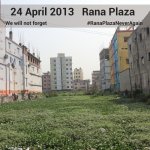Eight years after Rana Plaza new international Accord urgently needed
Apr 22, 2021 —
April 24 marks the eighth anniversary of the Rana Plaza disaster in which 1,134 workers were killed and 2,500 injured when a garment factory building collapsed. Today MSN is joining with Bangladeshi, international and Canadian allies in calling for a renewed commitment to worker safety in Bangladesh and other garment-producing countries.

